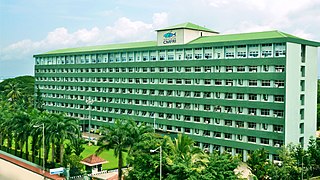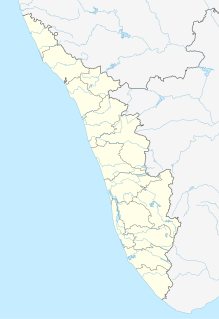This article relies largely or entirely on a single source .(September 2012) |
The Krishi Vigyan Kendra, Kannur under Kerala Agricultural University near Taliparamba has pioneered a new branch of agricultural extension called "creative extension".
This article relies largely or entirely on a single source .(September 2012) |
The Krishi Vigyan Kendra, Kannur under Kerala Agricultural University near Taliparamba has pioneered a new branch of agricultural extension called "creative extension".
Creative Extension uses art forms for agricultural communication. It calls for the involvement of people with histrionic talents. Creative Extension is the brainchild of Dr. K. Abdul Kareem, an agricultural extensionist of India Art as a medium for extension is hardly a novel experiment. What makes the initiative of Krishi Vigyan Kendra Kannur to disseminate agricultural information through entertainment different is that it seeks to preserve Kerala's vanishing folk song tradition in the agrarian culture. [1] In an attempt to preserve this rural song tradition, the KVK has brought out an audio cassette with 10 songs and an audio CD with 11 songs that draw on the folk songs that used to reverberate in the paddy fields in the State.
The tunes of these songs have been used to tune the songs in the cassette entitled `Vayalkili-vol I.' and CD entitled, `Vayalkili-vol II.' "We are losing our cultural heritage and our folk songs, which are the pulse of our rural culture," says K. Raghavan Master, veteran music director, in his introduction to the songs. The KVK's objective is to popularise the songs among farmers in the region and to introduce the indigenous cultural legacy to the new generation. The farmers' response to the songs vindicates the initiative. Collecting the traditional agrarian songs is a difficult task, but worth doing. M.P. Giridharan, Associate Professor at Regional Agricultural Research Station at Pilikode in Kasaragod, has written the lyrics of two songs in the cassette and four songs in the CD. The songs have been set to tune by former KVK employee and singer M.P. Jayasree, who along with M.A. Rajivkumar, has sung the songs.
As part of its Creative Extension series the Krishi Vigyan Kendra has conceived and produced an audio CD containing songs on Mushroom production
As part of its Creative Extension series the Krishi Vigyan Kendra, Kannur has conceived and produced an audio CD containing songs on animal (cow, goat, Japanese quail, rabbit) rearing
As part of its Creative Extension series the Krishi Vigyan Kendra, Kannur has conceived and produced video CD containing songs and visual on scientific animal (goat, Japanese quail) rearing
The Kendra has also brought out a tele-cine-drama `Thengukalude Nilavili' to disseminate awareness about the importance of group action, compact area group approach (CAGA) to solve problems like coconut mite. The central character in it is an aged coconut grower who treats coconut palms in his homestead as his children. Thanks to the intervention of an agricultural officer, who exhorts that the farmers should treat all coconut palms in the area as their children and not just the ones in individual homestead. The KVK seeks to satisfy the farmers' entertainment needs in its communication for development. Information in the forms of songs and tele-cine-drama and their dissemination through cassettes and CDs will make an impact.

The Central Arid Zone Research Institute (CAZRI) is one of the biggest research institutes of the Indian Council of Agricultural Research (ICAR), an autonomous organization working under the aegis of the Department of Agriculture Research and Education (DARE) of the Ministry of Agriculture and Farmers Welfare of Government of India. CAZRI has the distinction of being one of the first institutes in the world exclusively devoted to arid zone research and development. The institute made a humble beginning in 1952 when Government of India initiated Desert Afforestation Research Station at Jodhpur to carry out research on sand dune stabilization and for establishment of shelter belt plantations to arrest wind erosion. It was reorganized as Desert Afforestation and Soil Conservation Station in 1957 and finally in its present form Central Arid Zone Research Institute in 1959 on recommendation of the UNESCO expert, Prof. C.S. Christian of the Commonwealth Scientific and Industrial Research Organisation (CSIRO), Australia. In 1966, the institute was brought under the administrative control of Indian Council of Agricultural Research (ICAR), New Delhi.

The Central Marine Fisheries Research Institute(CMFRI) was established by Government of India on 3 February 1947 under the Ministry of Agriculture and Farmers Welfare and later, in 1967, it joined the Indian Council of Agricultural Research (ICAR) family and emerged as a leading tropical marine fisheries research institute in the world. The Headquarters of the ICAR-CMFRI is located in Kochi, Kerala. Initially the institute focused its research efforts on creating a strong database on marine fisheries sector by developing scientific methodologies for estimating the marine fish landings and effort inputs, taxonomy of marine organisms and the biological aspects of the exploited stocks of finfish and shellfish on which fisheries management were to be based. This focus contributed significantly to development of the marine fisheries sector from a predominantly artisanal, sustenance fishery till the early sixties to that of a complex, multi-gear, multi-species fisheries.

Kerala Agricultural University (KAU) is the primary and the principal instrumentality of the Kerala state in providing human resources, and skills and technology, required for the sustainable development of its agriculture, defined broadly encompassing all production activities based on land and water, including crop production (agriculture), forestry and fisheries through conducting, interfacing and integrating education, research and extension in these spheres of economic endeavour. It is situated in Vellanikkara, Thrissur, Kerala. Dr. R. Chandra Babu is the Vice-Chancellor and Dr. Sakeer Husain. A is the Registrar (i/c)

Chaudhary Charan Singh Haryana Agricultural University is a public funded agricultural university located at Hisar in the Indian state of Haryana. It is the biggest agricultural university in Asia. The university has 8645 acres of land. It is named after India's seventh Prime Minister, Chaudhary Charan Singh.

Central Agricultural University is an agricultural university at Lamphelpat, Imphal in the Indian state of Manipur.

Chaudhary Sarwan Kumar Himachal Pradesh Krishi Vishvavidyalaya, also known as CSK Himachal Pradesh Agricultural University, formerly Himachal Pradesh Krishi Vishvavidyalaya, is an agricultural university at Palampur in the Indian state of Himachal Pradesh. It was established on 1 November 1978 as an expansion of the existing College of Agriculture established in May 1966. Hill agriculture is the focus of this university. The university is accredited by the Indian Council of Agricultural Research (ICAR).
Dr. Balasaheb Sawant Konkan Krishi Vidyapeeth, formerly Konkan Krishi Vidyapeeth, is an agricultural university at Dapoli in Ratnagiri district of the Indian state of Maharashtra. It was established on 18 May 1972 as Konkan Krishi Vidyapeeth, and got its present name on 12 February 2001 in memory of third Chief Minister of Maharashtra Shri. P. K. Sawant. Its research centre at Karjat has developed some patented varieties of rice. Its major focus areas are rice, horticulture and fisheries. In 1997, it received the Best Institute Award of the Indian Council of Agricultural Research. Dr. SD Sawant is the 14th Vice Chancellor of this University, he was appointed by Chancellor Ch. Vidyasagar Rao on 7 March 2019.

Odisha University of Agriculture and Technology (OUAT) was established in Bhubaneswar, Odisha, India in 1962. It is the second oldest agricultural university in the country. It is dedicated to agriculture related research, extension and education. The University has 11 constituent colleges. The University has separate wings for research, extension services and planning, monitoring & evaluation, etc.
A subsurface dyke a structure that is built in an aquifer with the intention of obstructing the natural flow of ground water, thereby raising the ground water level and increasing the amount of water stored in the aquifer. Acting as an underground barrier impermeable to water, it controls the groundwater flow in an aquifer and raises the water table.
Krishi Vigyan Kendra Kannur is a front-line agricultural extension center and one of the 700 KVKs financed by the Indian Council of Agricultural Research (ICAR). It opened on 30 March 2004 on the premises of Pepper Research Station, Panniyur under Kerala Agricultural University. KVK primarily works to influence the other extension systems of the district, caters to the training needs of the farmers and extension functionaries, and facilitates the spread of technologies tailored to the diverse environment of farmers.

Mitraniketan Vishwavidyapeetam for Open Learning & Total Development is a Non-Governmental organization located at Vellanad, which is 25 km away from Thiruvananthapuram, the capital of Kerala state in South India. It is a 500-member community, including a staff of 100 men and women. Mitraniketan works in the fields of innovation, training and extension in community development, environment, science, education and appropriate technology. The project was begun with a view to offering education and training in a holistic spirit to primarily socially underprivileged children and youngsters. The organization focuses on alternative education mode for development.

University of Agricultural Sciences (UAS), Raichur is a Public university exclusively dedicated to the study and research of agricultural sciences established by the Government of Karnataka at Raichur district through the University of Agricultural Sciences Act, 2009.
Mitraniketan K. Viswanathan was a social reformer, philanthropist and environmentalist in Kerala, India. He founded Mitraniketan, a non governmental organization in Vellanadu, Thiruvananthapuram in 1956.

The Indian Institute of Spices Research (IISR) is an autonomous organization engaged in agricultural research related to spices in India. The institute has its headquarters in Moozhikkal, Silver Hills, Kozhikode, Kerala and is a subsidiary of Indian Council of Agricultural Research (ICAR), New Delhi, under the Ministry of Agriculture, India.
Van Vigyan Kendra (VVK) or Forest Science Centres (FSC) has been established by Indian Council of Forestry Research and Education (ICFRE) of the Ministry of Environment and Forests Govt. of India. It intends to help disseminate various technologies developed by farmers, forest based industries and forest research institutes.

Koonam is a census village in Taliparamba Taluk in North Kerala Division, Kannur District of Kerala, India. It comes under Kurumathoor and chengalayi Panchayaths. It is located about 9 km (5.6 mi) from Taliparamba and 30 km (19 mi) north of Kannur.
A Krishi Vigyan Kendra (KVK) is an agricultural extension center in India. The name means "farm science center". Usually associated with a local agricultural university, these centers serve as the ultimate link between the Indian Council of Agricultural Research and farmers, and aim to apply agricultural research in a practical, localized setting. All KVKs fall under the jurisdiction of one of the 11 Agricultural Technology Application Research Institutes (ATARIs) throughout India.

Mananpur is a village situated in Okari Block in Jehanabad District of Bihar State in India. It is located 6.5 km from Bandhuganj and at 4 km from Telhara. The Total population of this village is around 1500.
Sundaram Verma is an Indian environmentalist. He was awarded Padma Shri, India's fourth-highest civilian award in 2020 for developing ‘dryland agroforestry' technique which helps tree plantation in arid regions of India.